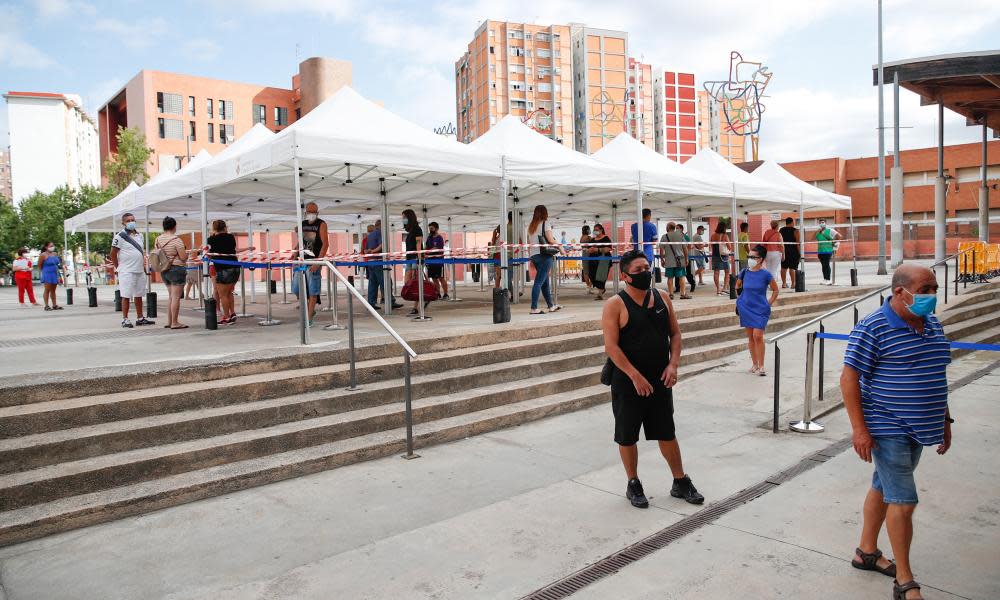Spain warned of dire impact of second coronavirus lockdown

As officials across Spain wrestle with a surge in the number of coronavirus cases, a chorus of voices is warning that another lockdown could have dire consequences for a country that just months ago emerged from one of Europe’s strictest confinements.
While cases of the virus have climbed across Europe, Spain has led the pack in recent days. More than 78,000 cases have been detected in the past two weeks, pushing the 14-day infection rate to 166 per 100,000, compared with 67 in France and 22 in the UK.
The steady rise has raised the spectre of fresh lockdowns in the coming weeks, particularly in Madrid where unions have warned that the primary care system is “on the edge of collapse”, due to a lack of staff and testing resources.
“If things continue as they are going, we’ll probably have to return to some sort of confinement, at least partially,” José Felix Hoyo Jiménez of the Spanish non-profit Médicos del Mundo told the broadcaster TeleMadrid on Monday. While the recent rise had been steady, it was likely to be less pronounced than what the country experienced in March and April, he added.
Speaking on Tuesday, Spain’s prime minister, Pedro Sánchez, seemingly rejected the idea of a nationwide lockdown, saying instead it would be left to regional authorities to take measure to halt the spread of the virus.
“The data is not good, the data is worrying,” he said. The rise in cases, however, was “far from the situation seen in mid-March” and not homogenous across the country, he added.
“We all – and it seems natural to me – think that the response we have to give in this second phase needs to be similar to that of the first phase. And it’s not like that,” he said, arguing that officials are now more prepared and have a better understanding of the virus.
Sanchez said regional authorities could ask the central government to apply a state of alarm in their territory, allowing them the power to limit people’s movement either partially or across the region.
The central government would also make available at least 2,000 soldiers to help regions with contact-tracing, he said.
Officials across Spain have at times resorted to specific or partial confinements – earlier this month ordering the central town of Aranda de Duero into lockdown and recently ordering the closure of all restaurants and bars in the town of Tielmes near Madrid – but have emphasised measures aimed at curtailing social activities.
In Catalonia, social gatherings would be limited to 10 people or fewer, the regional leader, Quim Torra, said on Monday. “The numbers are persistently increasing,” he added, describing the coming weeks as “decisive”. In the south-eastern region of Murcia, social gatherings would be limited to six people.
In Madrid, where the 14-day infection rate has soared to 366 per 100,000, authorities recommended on Friday that residents in the hardest-hit areas of the capital remained in their homes.
Enrique López, a regional official, widened this call on Monday, urging residents to avoid “unnecessary social interactions” as much as possible. “We’re in a very difficult moment – like everywhere in the world – and we have to make sacrifices. If we avoid unnecessary interactions, we avoid confinement,” he told the broadcaster Cadena Ser.
Spanish officials have suggested increased testing may partly explain the rise, adding that the majority of new cases are among people under the age of 65. The number of coronavirus deaths remains relatively low, at 96 in the past seven days.
As public health experts say the country is at a critical moment, the associations representing businesses across Spain have warned that their members continue to reel from a lockdown that ground the economy to a near-halt and triggered one of the deepest recessions in recent memory.
“A new confinement that would paralyse business activity would have catastrophic and irreversible consequences,” the country’s main business lobby, CEOE, said in a statement.
Psychologists have also sounded the alarm, pointing to the many in Spain who continue to grapple with the impact of a lockdown that initially barred residents from leaving their homes to walk or exercise and forced most children to remain in their homes for six weeks.
One study looking at children in Spain and Italy found that 86% of parents surveyed reported changes in their children’s emotional state during the lockdown, ranging from difficulty concentrating to irritability. The changes appeared to be more pronounced among children in Spain, suggesting the stricter lockdown might have played a role.
Adults also continued to struggle with the impacts of the lockdown, said María Rosario Gomis Ivorra, a psychologist who specialises in emergency care. “We’ve seen a lot of depressive episodes,” she said, “lots of anxiety and anxiety-related disorders.”
She said she was concerned another confinement would exacerbate these issues. “It would be awful. We haven’t recovered from the first one, our reserve of resilience is still worn down,” she said. “Not just awful, it would be more perilous than the first time. The disorders would be more serious.”

 Yahoo News
Yahoo News 
